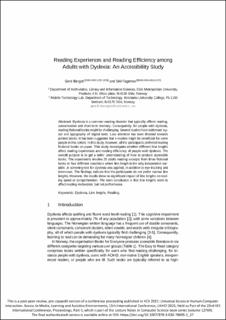Reading experiences and reading efficiency among adults with dyslexia: An accessibility study
Conference object
Accepted version
Permanent lenke
https://hdl.handle.net/11250/2837892Utgivelsesdato
2021-07-03Metadata
Vis full innførselSamlinger
Originalversjon
https://doi.org/10.1007/978-3-030-78095-1_17Sammendrag
Dyslexia is a common reading disorder that typically affects reading, concentration and short-term memory. Consequently, for people with dyslexia, reading fictional books might be challenging. Several studies have addressed layout and typography of digital texts. Less attention has been directed towards printed books. It has been suggested that e-readers might be beneficial for some people in this cohort. In this study, however, all the participants preferred reading fictional books on paper. This study investigates whether different line lengths affect reading experiences and reading efficiency of people with dyslexia. The overall purpose is to get a better understanding of how to produce accessible books. The experiments involve 20 adults reading excerpts from three fictional books in four different conditions where line length is the only independent variable. A screening-test for dyslexia was applied, in addition to eye-tracking and interviews. The findings indicate that the participants do not prefer narrow line lengths. However, the results show no significant impact of line lengths on reading speed or comprehension. The main conclusion is that line lengths seem to affect reading motivation, but not performance.
